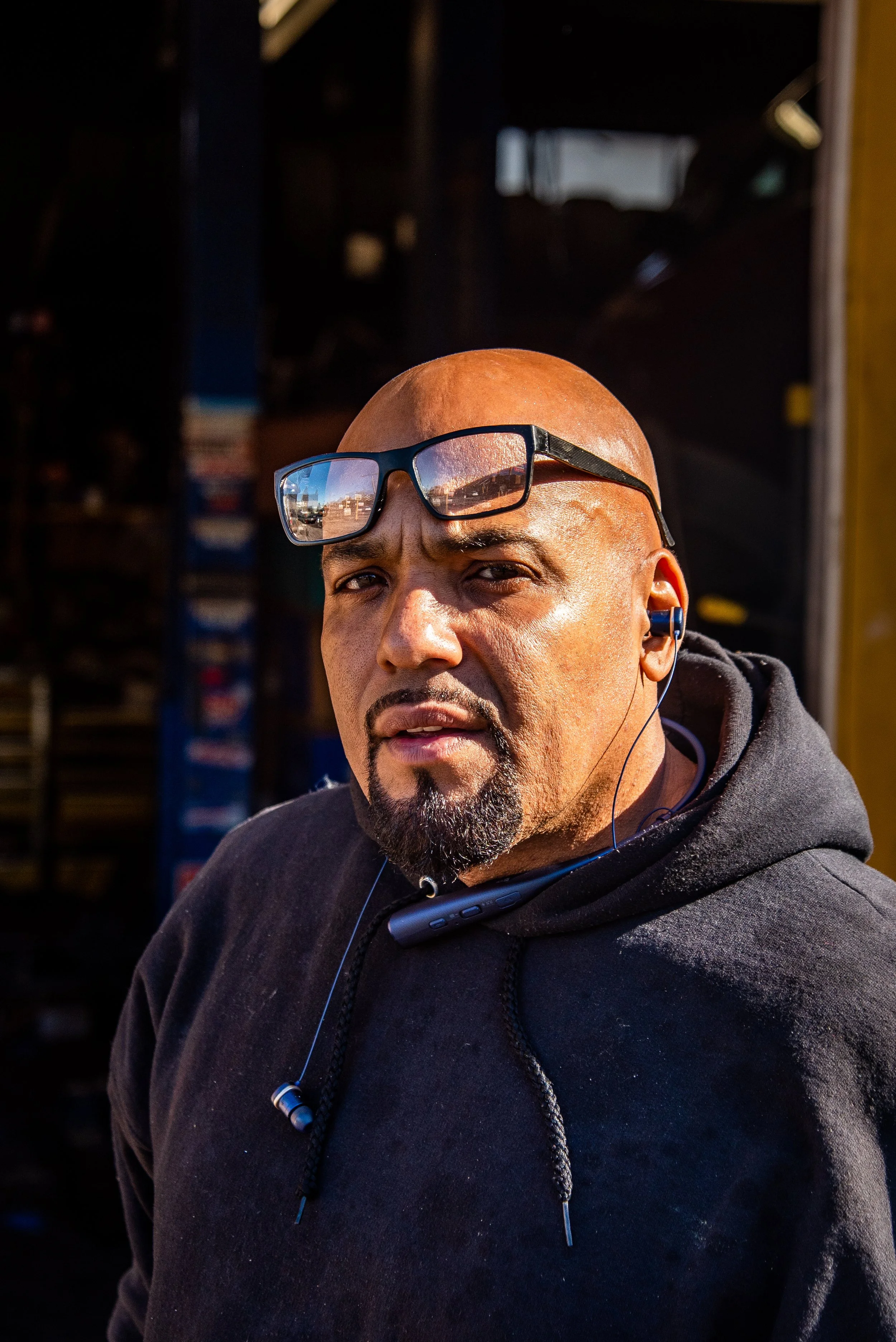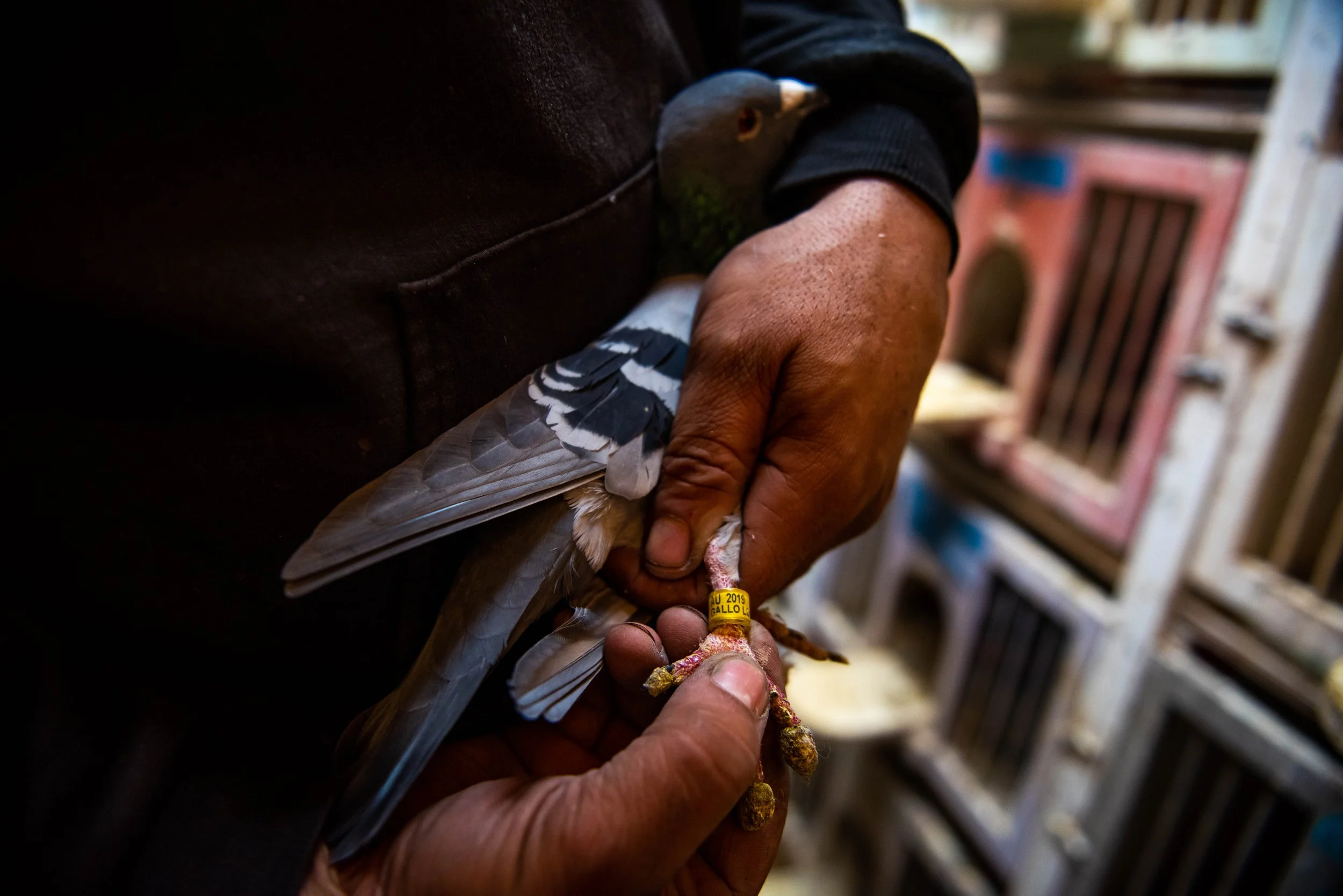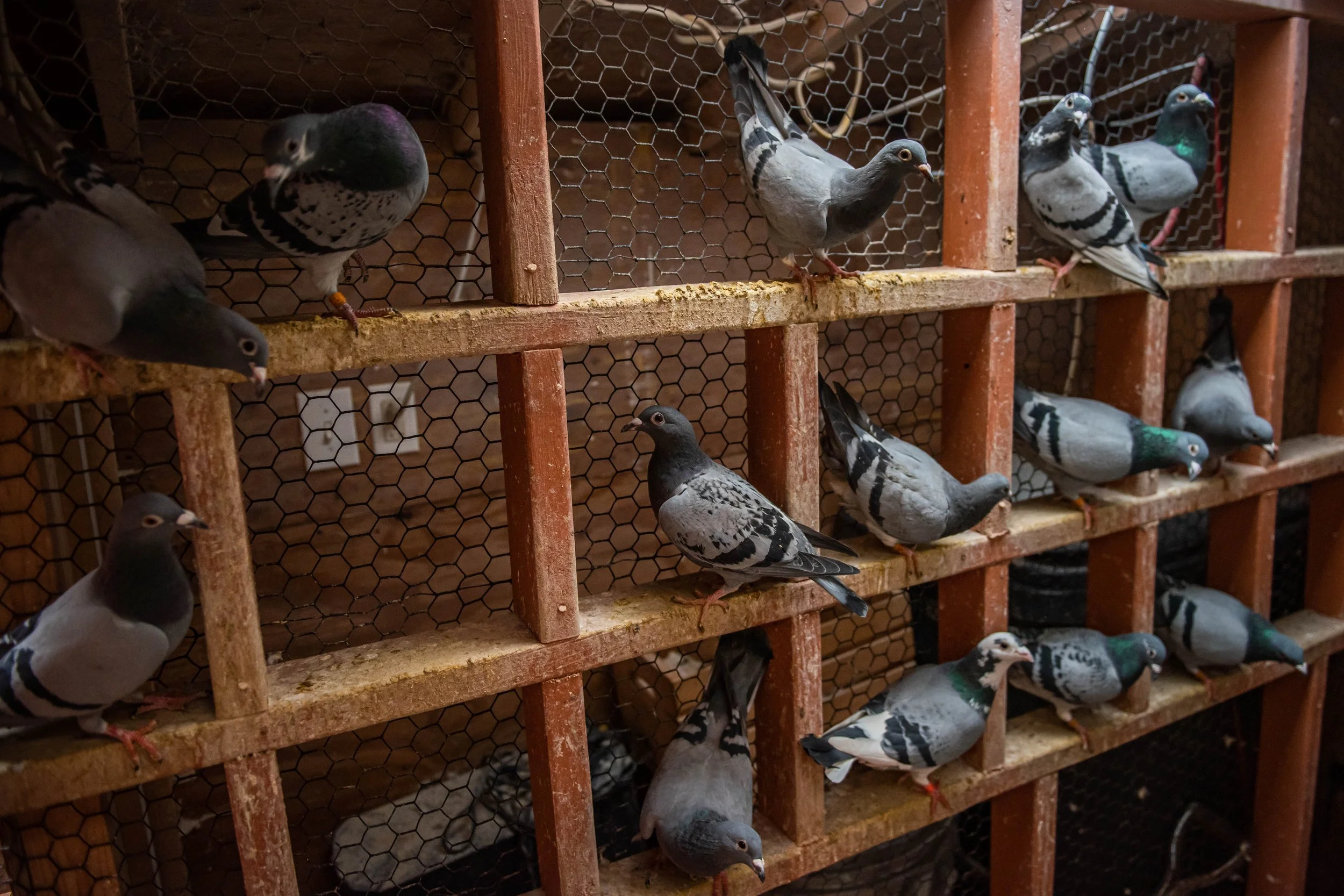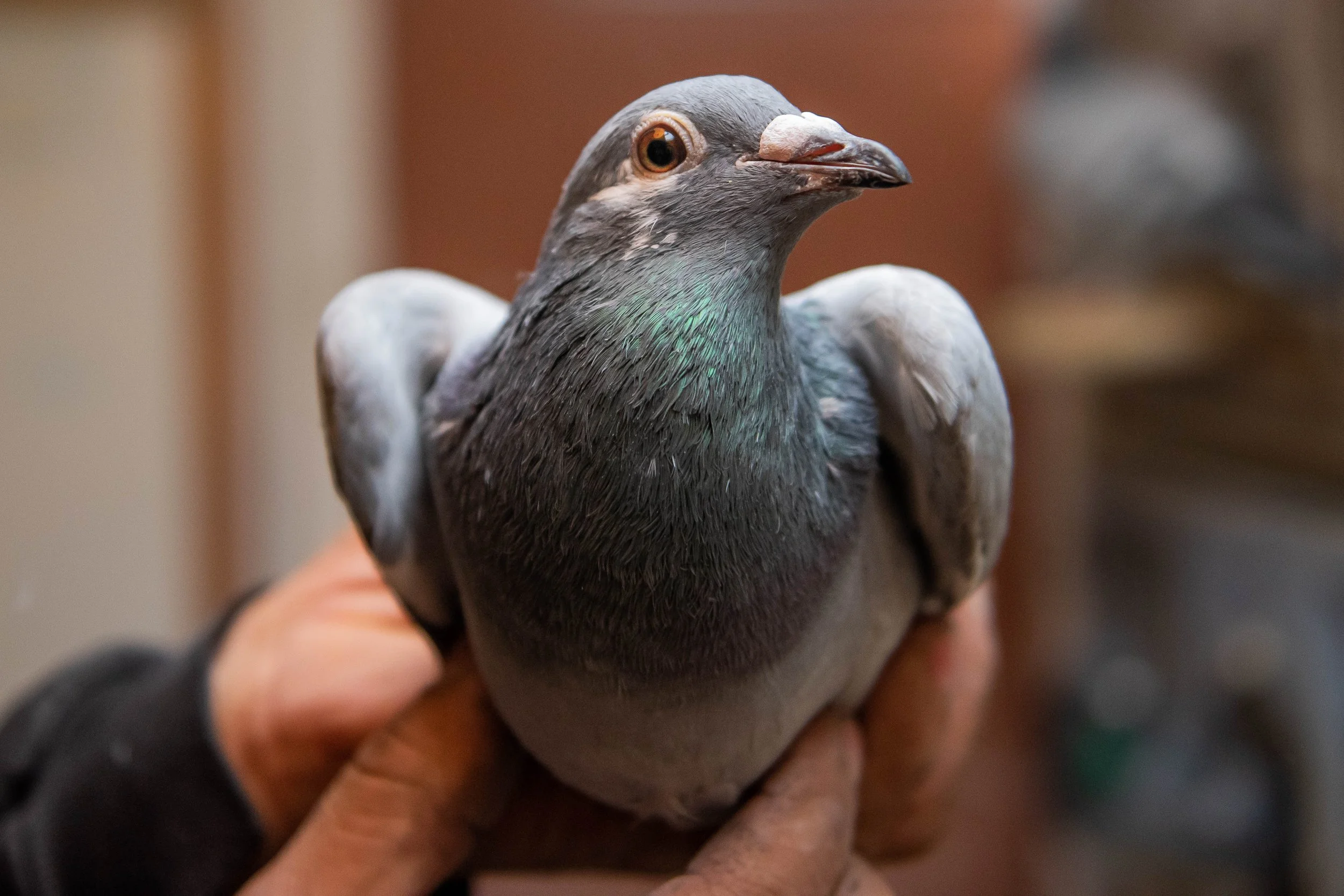Pigeons fly throughout Pep Bachier’s pigeon coop in Roxbury, MA.
Inside the world of New England Pigeon Racing
‘I want to be a champion,’ he says. ‘I want the world to know who I am.’
This story originally appeared in the Boston Globe Magazine
A barrage of flapping wings greets visitors to Rafael “Pep” Bachier’s bird coop, an RV-size space tucked beside his bright yellow Roxbury auto repair shop. Close to 40 rainbow-colored cubbies, one for each pair of breeding pigeons, line the walls. While the smell of 100 birds isn’t as bad as you might imagine — it’s more a mix between a clean petting zoo and the healthiest multigrain bar at Whole Foods — it’s still a bird coop, feather dust and all.
Bachier, 49, spends 15 hours there every week. He’s part of a small band of people locally — with over 10,000 nationally — trying to keep the sport of homing pigeon racing alive. The concept is simple: Release the birds hundreds of miles from their home and the one that returns the fastest, wins. While scientists aren’t sure how homing pigeons find their way back, some speculate these intrepid birds could be relying on Earth’s magnetic field, the sun, their memory, or even their strong senses of hearing and smell.
“The racing part is nice, but the joy of seeing that bird come home, it’s amazing. You can’t even explain it,” Bachier told me late last year as he was replacing brake pads on a car.
Bachier got started in 2015 with four pigeons he named Bonnie, Clyde, Blanca, and Benny Blanco. He joined the Braintree-Norwood chapter of the Greater Boston Homing Pigeon Concourse, which has supported local racing enthusiasts since 1928. Last year the concourse put on 20 races, with older birds released from as far away as Ohio, ending some 600 miles later at their home coops in Massachusetts.
But the greatest glory comes from the One Loft Race competitions held on almost every continent, attracting winged contestants from around the globe for a chance to win a championship and top prize money — more than $1 million at some events in China. Massachusetts’ first-ever One Loft Race, the New England Derby, is planned for October (unless COVID-19 forces rescheduling) and will award the winner $100,000. Several months before the start date, participants will ship their young pigeons to the race organizer to be raised and trained in the same loft — in this case, a huge, brand-new coop in Hanson. This uniform upbringing evens the odds, leaving genetics — and luck — to decide the winner.
In 2018, Bachier entered the South African Million Dollar Pigeon Race, with a chance to win $300,000. His birds didn’t place, but he’s hoping for a better outcome at the inaugural New England Derby, where 1,500 birds will compete. Prize money would more than cover the roughly $1,600 a year Bachier spends on bird food, care, and national and local membership fees.
A microchip placed near each pigeon’s identification band uses GPS to track distance and time, allowing the calculation of the pigeon with the fastest time-to-distance ratio. Racing pigeons can reach speeds close to 70 miles per hour with the right wind blowing behind them. In a large competition, close to 5 percent of them won’t make it home, lost to hawks or some other fate.
It only takes about three months for a pigeon to go from hatchling to a fully grown, flying speedster. Breeding these fancy birds isn’t mandatory to enter the world of pigeon racing, but nearly everyone in the Braintree club does. Bachier follows a popular training approach: For the first few days, he frees the birds to soar into the sky and circle their coop for hours at a time like synchronized ballerinas. Then he begins releasing them 1 mile away from their coop, increasing the distance to 3 miles, then 5, 10, 20, 40, 60, 80, and eventually up to 100 miles from home. Most days his wife, Beckie, is the one who takes the long drives to liberate the birds while Bachier works in the auto shop. The birds fly faster and faster each time.
While the sport may be declining in membership in Massachusetts, that doesn’t stop Bachier from breeding more birds.
“It’s very similar to teaching a child how to add,” says Kevin Williams, a retired police lieutenant and the recording secretary of the Braintree pigeon club. “Once you teach them how to do it enough times, they’re pretty much tuned in.”
Another club member, David Ward of Weymouth, is up no later than 5 o’clock most mornings to train his young birds. That early hour is required, he says, to avoid the hawks that begin prowling for a lunch of pigeons by noon.
Homing pigeons have helped humans communicate for generations, often serving military purposes. The Army had its own pigeon service until 1957, with certain birds rising to heroic status by helping turn the tide in World War II.
Williams’ interest started as a boy in 1959. While on his newspaper delivery route, he happened upon a neighbor with crates of pigeons in the front yard. “I went home and told my father about it,” he says. “[He] saw a little spark in my eye and said, ‘[You’ve] got an uncle that races pigeons.’” Soon after, Williams returned home from Uncle Jasper’s with two birds. Williams joined Braintree’s pigeon club in 1967 at age 18, and years later, named his youngest son after the man who’d introduced him to his favorite hobby.
All along, the birds have provided Williams an escape. Whether it was coming back from a three-year stint in Vietnam or a late-night call that shook him to his core — which happened often during his 33-year career as a patrolman and lieutenant with the QuincyPolice Department — the pigeons were there to come home to. “You can always trust [an] animal because they can’t lie to you,” says the 71-year-old.
A macro shot of one of Bachier’s pigeons that fly upward of 600 miles during some of their races.
Like Williams, Ward’s interest was sparked by relatives. His father raced birds in Ireland before Ward’s birth, and when the family moved to Dorchester in 1986 when Ward was 11, the birds came too. He’d help his father band baby pigeons and feed them during the offseason. But it wasn’t until February 2015, when he was struggling to overcome an opioid addiction — a scourge that’d already taken his brother’s life — that his fascination grew. To distract himself, Ward began spending hours every day with his father’s birds, learning everything about their care and training.
And it worked: He hasn’t had a sip of alcohol or taken a single opiate since 2015. In just his second year as a racer, Ward’s birds won the 500-mile New England Open. He’s bred hundreds of youngsters and earns a steady income creating macro photos of pigeons for sale by a top-tier pigeon exporter.
Ward, 43, is the one who gave his fellow Braintree-Norwood club member Bachier his first four birds.
For Bachier, the sky’s the limit. “I want to be a champion,” he says. “I want the world to know who I am.”




